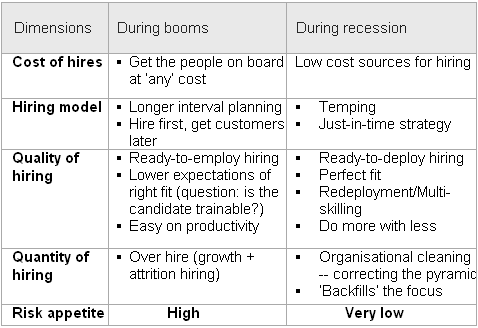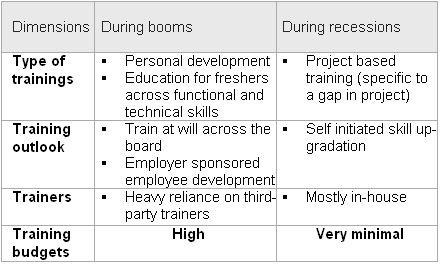
No one needs an introduction to the word recession in these times. Though the Indian economy is still growing, organisations are taking all possible steps to ensure that they survive through these uncertain times of global recession. One such change has taken place in the recruitment and training departments of most organisations.
According to a recent survey conducted by the Boston Consulting Group, when organisations were asked about the steps they are taking to respond to this crisis, they got the following responses:
If we look at this data, it is quite evident that out of the top seven measures being taken to control costs, five are related to the area of recruitment and training.
The adjacent table shows how the recruitment and training departments change their outlook when the times change from a high growth environment to an uncertain environment of recession.
Text: Amit Bansal. The author is the CEO of PurpleLeap (https://www.purpleleap.com/) an employability skill enhancement initiative of Educomp Solutions Pvt Ltd.

Thus, organisations tend to look for people who are a perfect fit for a role instead of looking at resources who are 'generally smart' but need a time of 3 to 4 months before they can start producing results.
The recruitment strategy and training strategy go hand in hand. Let us look at this part of the human resource management (adjacent table):
It is quite evident that organisations will cut down on training budgets to save costs in times of recession. However, businesses still need competent people who can deliver services to the customers.
Part of this responsibility is shifted to the recruitment team where they are mandated to find the 'right-fit' candidates who do not need long training cycles. Business teams, who provide 'project-specific' training to new members of the team, so that the overall training costs could be minimised, share part of the responsibility.

So, what should the freshers do?
Upgrading skills
First and foremost, students need to invest in up-skilling themselves. Apart from upgrading problem solving, communication and technical skills, students need to make sure that they prepare for specific roles in the industry. It would be a good idea to target a particular role and attain technical and functional expertise for that role itself.
For instance, students wanting to make a career in software engineering should make sure that they know the relevant technology (say programming using Microsoft platform) and the processes and tools that they are supposed to work on in their first year of work-life.
Prepare for short-term assignments
Temping and contracting organisations provide skilled manpower to organisations on an assignment basis. If freshers do not get into regular full-time jobs, they should be prepared to work on a temporary or contract basis with such organisations.
Students can overcome the prevalence of this gloomy environment with an appropriate career plan. A levelheaded thinking about the realistic choices in the short-term will go a long way in laying the foundation for a life-long career.
Be it in terms of skill enhancement or targeting the right kind of companies, any choice that enhances an individual's professional value is bound to yield results over a period of time.